Quaid-e-Azam






The central theme ever present in Beaumont 's historic paperwork is that Mountbatten not only bent the rules when it came to partition - he also bent the border in India 's favour.
The documents repeatedly allege that Mountbatten put pressure on Radcliffe to alter the boundary in India 's favour.
On one occasion, he complains that he was "deftly excluded" from a lunch between the pair in which a substantial tract of Muslim-majority territory - which should have gone to Pakistan - was instead ceded to India .
Beaumont 's papers say that the incident brought "grave discredit on both men".
Punjab 'disaster'
But Beaumont - who later in life was a circuit judge in the UK - is most scathing about how partition affected the Punjab , which was split between India and Pakistan . 
Signing away eastern Punjab

Signing of Partition of Pakistan
 Train to Pakistan steaming out of New Delhi Railway Station, 1947.
Train to Pakistan steaming out of New Delhi Railway Station, 1947.
 a long oxcart train 1947. Margaret Bourke-White.
a long oxcart train 1947. Margaret Bourke-White.
 Over 10 million people were uprooted from their homeland and travelled on foot, bullock carts and trains to their promised new home.
Over 10 million people were uprooted from their homeland and travelled on foot, bullock carts and trains to their promised new home.

One of the most profound and powerful photos I have ever seen in my life. You take away their homes and families but they as they put their head on the ground they will say Allah is the Greater than everything (incl. their houses and their families (destroyed and killed by earthquake.)
 Muhammad Ali Jinnah, Cover Time Magazine, April 22, 1946
Muhammad Ali Jinnah, Cover Time Magazine, April 22, 1946
 Two Muslim men (in a rural refugee train headed towards Pakistan) carrying an old woman in a makeshift doli or palanquin. 1947.
Two Muslim men (in a rural refugee train headed towards Pakistan) carrying an old woman in a makeshift doli or palanquin. 1947.
Massive population exchanges occurred between the two newly-formed nations in the months immediately following Partition. Once the lines were established, about 14.5 million people crossed the borders to what they hoped was the relative safety of religious majority. Based on 1951 Census of displaced persons, 7,226,000 Muslims went to Pakistan from India while 7,249,000 Hindus and Sikhs moved to India from Pakistan immediately after partition. About 11.2 million or 78% of the population transfer took place in the west, with Punjab accounting for most of it; 5.3 million Muslims moved from India to West Punjab in Pakistan, 3.4 million Hindus and Sikhs moved from Pakistan to East Punjab in India; elsewhere in the west 1.2 million moved in each direction to and from Sind.

A refugee train on its way to Punjab, Pakistan

Photo of a railway station in Punjab. Many people abandoned their fixed assets and crossed newly formed borders.




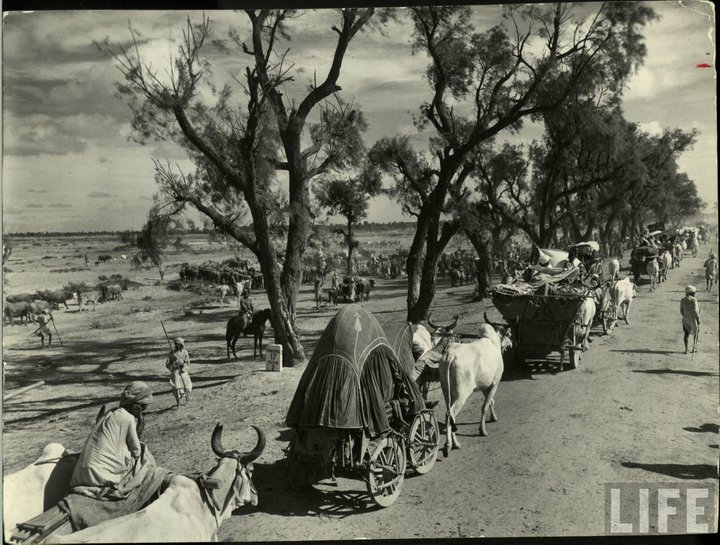


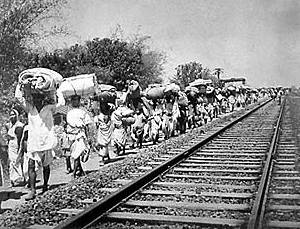


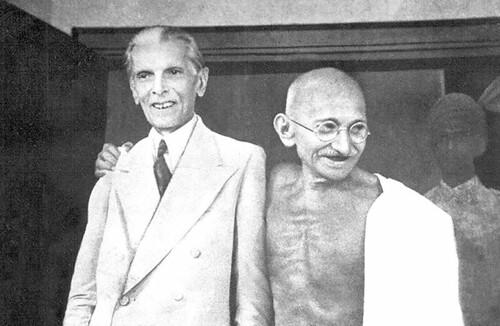




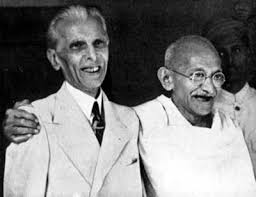
Quaid-e-Azam Passport
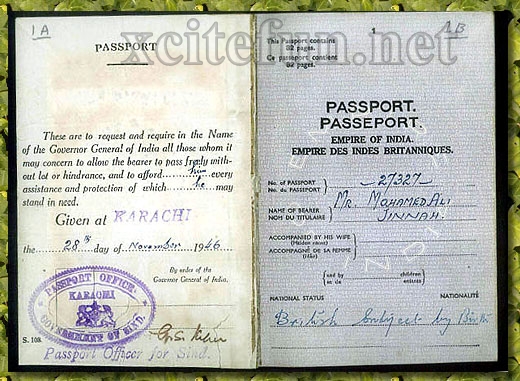
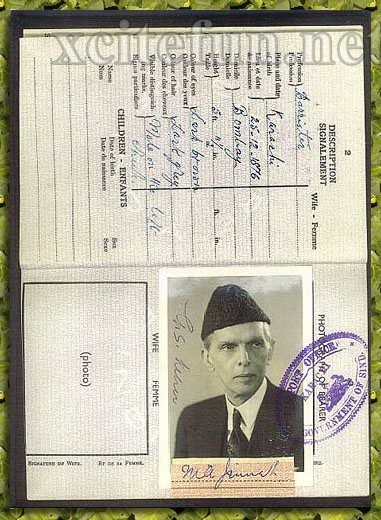
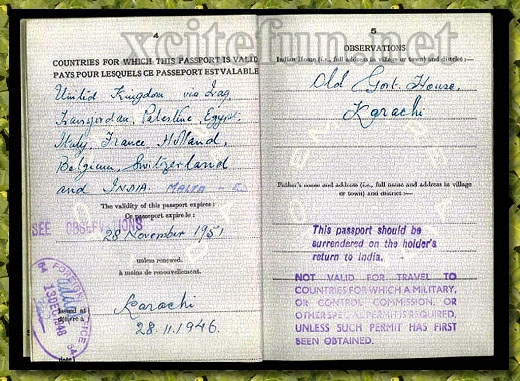
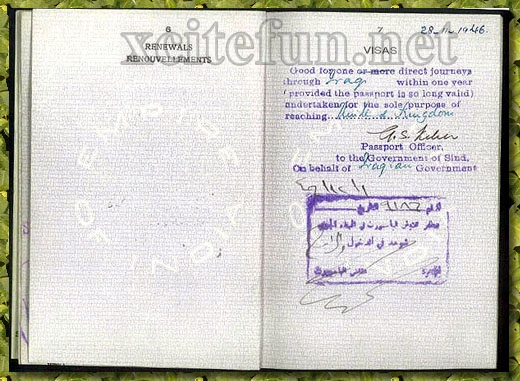
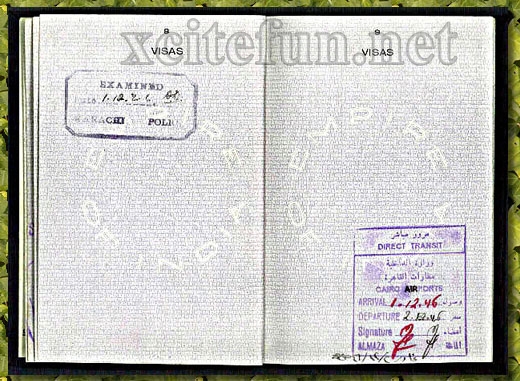
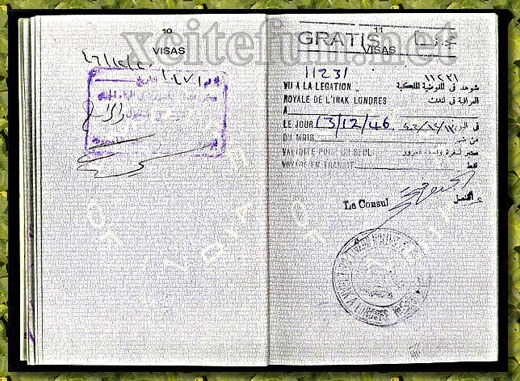
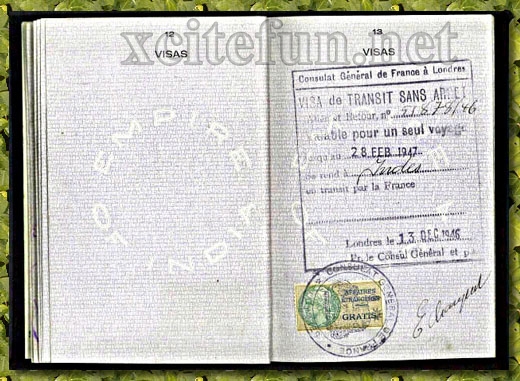
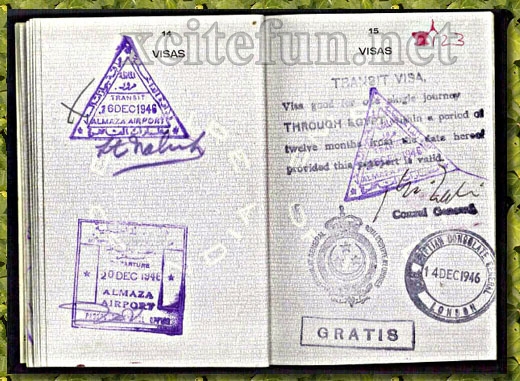
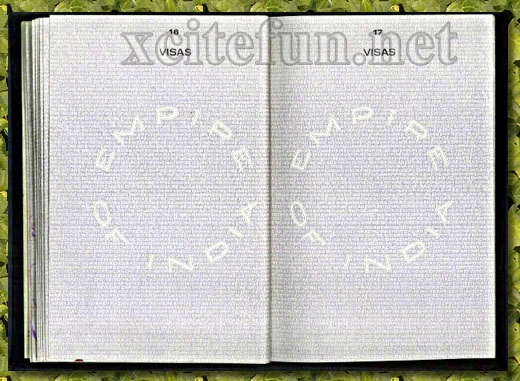
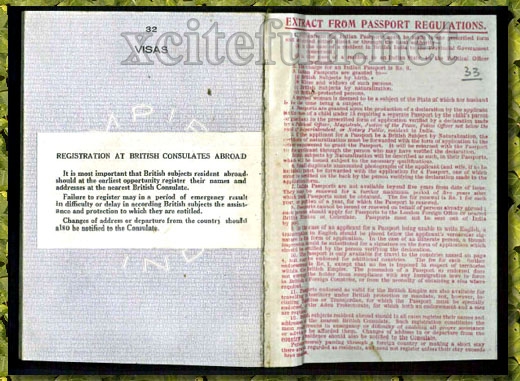
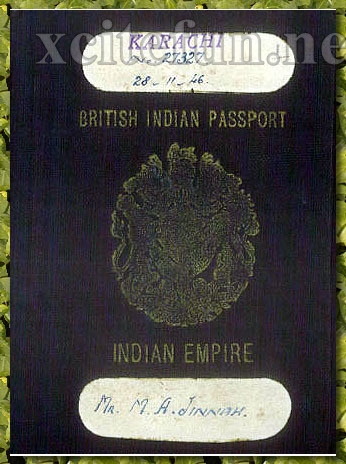
Quaid-e-Azam Muhammad Ali Jinnah, the man who laid the foundations of the Islamic Republic of Pakistan, was born on
December 25, 1876 at Vazeer Mansion located in Karachi. He was a visionary who was gifted with immense leadership skills
and possessed the potential to become the guide of his generation and many more to come.
His leadership qualities outshone throughout his academic and professional life and became an integral part of his persona.
--
--
For University of Pakistan Study Material Sharing, Discussion, etc, Come and join us at http://4e542a34.linkbucks.com
You received this message because you are subscribed to the Google
Groups "Study" group.
To post to this group, send email to http://ca13054d.tinylinks.co
For more options, visit this group at
http://004bbb67.any.gs
.Maps and Partition..................
World 1772



1909 Prevailing Religions, Map of British Indian Empire, 1909, showing the prevailing majority religions of the population for different districts.

1909 Percentage of Hindus, Map of British Indian Empire, 1909, showing percentage of Hindus in different district

The documents repeatedly allege that Mountbatten put pressure on Radcliffe to alter the boundary in India 's favour.
On one occasion, he complains that he was "deftly excluded" from a lunch between the pair in which a substantial tract of Muslim-majority territory - which should have gone to Pakistan - was instead ceded to India .
Beaumont 's papers say that the incident brought "grave discredit on both men".
Punjab 'disaster'
But Beaumont - who later in life was a circuit judge in the UK - is most scathing about how partition affected the Punjab , which was split between India and Pakistan .

Signing away eastern Punjab

Signing of Partition of Pakistan




One of the most profound and powerful photos I have ever seen in my life. You take away their homes and families but they as they put their head on the ground they will say Allah is the Greater than everything (incl. their houses and their families (destroyed and killed by earthquake.)


Massive population exchanges occurred between the two newly-formed nations in the months immediately following Partition. Once the lines were established, about 14.5 million people crossed the borders to what they hoped was the relative safety of religious majority. Based on 1951 Census of displaced persons, 7,226,000 Muslims went to Pakistan from India while 7,249,000 Hindus and Sikhs moved to India from Pakistan immediately after partition. About 11.2 million or 78% of the population transfer took place in the west, with Punjab accounting for most of it; 5.3 million Muslims moved from India to West Punjab in Pakistan, 3.4 million Hindus and Sikhs moved from Pakistan to East Punjab in India; elsewhere in the west 1.2 million moved in each direction to and from Sind.

A refugee train on its way to Punjab, Pakistan

Photo of a railway station in Punjab. Many people abandoned their fixed assets and crossed newly formed borders.











Dec 25, 1876: Born at Karachi
1882: Education started at home
July 4, 1887: Admitted to Sind Madrasatul Islam, Karachi
1892: Married Emibai at the age of 16
1892: Left Karachi for Europe
1896: Returned to Karachi from London
1900: Appointed Presidency Magistrate, Bombay
1906: Appointed Personal Secretary to Dadabhoy Naoroji
1909: Elected to the Supreme Imperial Council uncontested
1910: Elected to the Legislative Assembly, Bombay
1913: Joined All-India Muslim League
Dec 1916: Presided over the All-India Muslim League Lucknow session; Lucknow Pact signed
Apr 18, 1918: Married Rattenbai at Calcutta
Aug 15, 1919: Daughter (Dina) born
1919: Resigned from the Imperial Legislative Council as a protest against Rowlatt Act
Oct 3, 1920: Resigned from Home Rule League
1920: Resigned from the Congress on differences with Gandhi
1922: Participated in All Parties Conference in Bombay as one of the three Secretaries
1923: Elected to the Imperial Legislative Council from Bombay
1924: Preside over the All-India Muslim League session in Lahore
1927: Boycotted the Simon Commission.
1928: Rattenabi died
Dec 1928: Attended National Convention at Calcutta
Jan 1929: Jinnah's amendments to Nehru Report rejected
Mar 1929: All-India Muslim League rejects Nehru Report at its Delhi session
1929: Jinnah presented his Fourteen Points
1930: Attended Round Table Conference in London
1931: Stayed on in England; gave up political activities temporarily
Apr 1934: Returned to India, got actively engaged in politics
1934: Again elected to the Central Legislative Assembly
1934: Elected Permanent President of the All-India Muslim League
1934: Elected leader of the Independent Party in the Assembly
1935: Government of India Act, 1935 passed
1935: Jinnah-Rajendra Prasad Formula
1936: Constituted All-India Muslim League Central Parliamentary Board to fight elections under 1935 Act
1937: Provincial elections under the 193 Act
July 1937: Congress forms Ministries in six provinces; Congress raj begins
Oct 1937: Jinnah presides over League session at Lucknow. All India Muslim League turned into a mass organisation and complete independence adopted as goal.
Apr 1938: Presides over Special League Session at Calcutta
Dec 1938: Presides over League Session at Patna
1939: Demands Royal Commission to inquire into Muslim grievances under Congress rule
Dec 22, 1939: Day of Deliverance observed (on exit of Congress Ministries)
Mar23, 1940: Historic Lahore Resolution passed
July 26, 1943: Rejected Rajagopalachariya formula
Dec 24, 1943: Presided over All-India Muslim League's Karachi Session. Toured the subcontinent like a storm
Sept 1944: Jinnah-Gandhi Talks
1945: Participated in Simla Conference. Elected to Central Legislative Assembly
Jan11, 1946: All-India Muslim League sweeps the polls in Muslim constituencies; Victory Day
Apr 4, 1946: Meeting with Cabinet Mission
Apr 9, 1946: Called a convention of All Muslim members of the Central and Provincial Assemblies at Delhi
May 16, 1946: Cabinet Mission Plan announced
June 1946: League accepts Cabinet Mission Plan. League also accepts Short-term (Interim Government) Plan.
July 1946: Conditional acceptance of Cabinet Mission Plan by Congress. Congress rejects Short-Term Plan. Viceory's volte face on the formation of Interim Government.
All-India Muslim League withdraws earlier acceptance, rejects Cabinet Mission Plan and announces boycott of Constituent Assembly.
Called upon Members to renounce all British titles and honours in protest against British attitude towards Muslims and decides to launch Direct Action to wrest Pakistan
Aug 16, 1946: Direct Action Day
Oct 25, 1946: All-India Muslim League agrees to participate in the Interim Government
Dec 2, 1946: Reached London on invitation from Secretary of State
Dec 6, 1946: British Government's clarification upholds League's viewpoint on Cabinet Mission Plan
Feb 20, 1947: Prime Minister Attlee announces that the British would relinquish power in India by June 1948
June 3, 1947: Plan envisaging partition of India and establishment of Pakistan announced. Jinnah's historic broadcast accepting the Plan
July, 1947: Indian Independence Act passed by British Parliament
Aug 7, 1947: Left Delhi for Karachi by air
Aug 11, 1947: Elected President of Pakistan Constituent Assembly. Presidential address in the Constituent Assembly. Title of 'Quaid-i-Azam' conferred on him
Aug 14, 1947: Pakistan comes into being; the Quaid-i-Azam sworn in as the first Governor General
Oct 1947: Set up Headquarters at Lahore to supervise settlement of refugees in the Punjab.
Dec 25, 1947: First official birthday
July 1, 1948: Inaugurated State Bank of Pakistan; gave a call for involving a new economic system
July 14, 1948: Left Karachi again for rest at Ziarat
Aug 14, 1948: First Independence Day; last message to the nation
Sept 11, 1948: Returned to Karachi from Ziarat; Breathed his last
Quaid-e-Azam Mohammad Ali Jinnah, founder of the Islamic Republic of Pakistan was diagonosed with Tuberculosis in the 1940s.
He hid his disease
Jinnah at a glance
Quaid-e-Azam Muhammad Ali Jinnah's famous Urdu speech where he said,
" Musalman musibat mai ghabrya nahi karte".
Listen carefully to this historic speech which motivated millions of newly emerged nation.
t.
.




Quaid and Ghandi


Quaid-e-Azam Passport











BY ASRA AFTAB · JANUARY 4, 2012 · 9 COMMENTS AND 7 REACTIONSHEADLINE, THE JINNAH ARTICLES · TAGGED: CONGRESS, INDEPENDENT, INDIA,MUHAMMAD ALI JINNAH, MUSLIM LEAGUE, PAKISTAN, PICTURE, QUAID-E-A
December 25, 1876 at Vazeer Mansion located in Karachi. He was a visionary who was gifted with immense leadership skills
and possessed the potential to become the guide of his generation and many more to come.
His leadership qualities outshone throughout his academic and professional life and became an integral part of his persona.
Need Your Comments.....!
For University of Pakistan Study Material Sharing, Discussion, etc, Come and join us at http://4e542a34.linkbucks.com
You received this message because you are subscribed to the Google
Groups "Study" group.
To post to this group, send email to http://ca13054d.tinylinks.co
For more options, visit this group at
http://004bbb67.any.gs


No comments:
Post a Comment